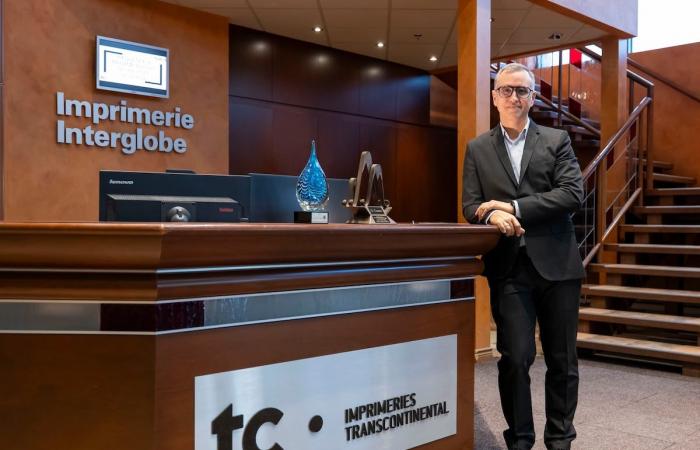By writing Mr. Paper’s Great Journey (2013), which explains to children how recycling works, the author and publisher Angèle Delaunois took a closer look at the major book chain. Certain steps, including the transport of the works and the printing of them internationally, seemed totally “absurd” to him.
For the founder of the isatis editions, it was necessary to take action… But how? By placing bulk orders with printers. Because the larger the circulation – the number of books printed – would be, the lower their unit cost would be.
In 2019, six publishers agreed to bring together their production around a common calendar, at TC Transcontinental, in Beauceville.
“The idea of consolidation is quite simple: it’s the idea of using the same paper, the same binding and printing at the same time to benefit from economies of scale. But the issue was not only economic. It was also cultural and ecological,” explains André Martin, responsible for the program in which the youth group at TC Transcontinental participates.
The group’s books are printed about an hour from Quebec, in Beauceville, in a TC Transcontinental factory which employs around 300 people. (Frédéric Matte, The Sun)
In order to create a “100% Quebecois” product, the publishers asked to print their products on paper made here.
«[L’initiative] brought down our cost prices! We perhaps saved around 20% on printing,” rejoices Ms. Delaunois, who sold her business last year to Éditions Écosociété.
“I have always told my colleagues: we are competitors, but we are not enemies. If we can help each other and do things together, let’s do it.”
— Angèle Delaunois, author and founder of Editions de l’isatis
Today, around twenty publishing houses now participate in the grouping.
Beyond profits
Beyond the figures and profit margins, the participants of the group therefore come together around a common cause.
Éditions Fonfon and La Court Escale were among the first houses to take part in the merger. And this, mainly for a question of values.
While it helps reduce the gap between the Quebec and international markets, the grouping does not make it possible to compete with printing costs in Asia or Europe. But it does, however, create a real option for many local businesses, believes Mariève Talbot, general director of La courte éscale.
“The only thing we are currently sending outside is the “complete box” because this expertise does not exist here. […] We still think that it is important that there is a local proposal for [les jeunes enfants]», underlines Mariève Talbot.
By coming together, publishing houses must agree to print their books with the same type of cover, binding and paper. (Frédéric Matte/Le Soleil)
At Fonfon, books have always been marked “printed in Quebec”. But Véronique Fontaine, general director of the publishing house, did not hesitate for very long before joining the group.
“Sometimes I tell myself that it’s really not a business choice [d’imprimer ici]. At the same time, [au début]I relied a lot on people’s sensitivity to local products… I think that today it is even greater,” observes Ms. Fontaine, also vice-president of ANEL.
“In my opinion, [imprimer au Québec]it has always been important. I always did it. But those who don’t, I completely understand why.”
— Véronique Fontaine, general director of Fonfon editions
Coming together, a large-scale solution?
The idea of bringing together publishers’ order books is not anchored in a clear and clear trend, but TC Transcontinental was no stranger to this concept.
«[C’est un projet] which was quite easy for us. We had experience because we had already created programs like this for other markets. We already had this culture here [à l’usine de Beauceville]», explains André Martin, head of the youth initiative.
Could a program like this convince other publishers to bring their prints back here? Perhaps, according to Mr. Martin.
Responsible for the program which brings together Quebec children’s publishers, André Martin has worked for more than 30 years in the field of printing. (Frédéric Matte/Le Soleil)
“This year, we decided to open the program to the English-speaking Canadian and American markets. The more participants there are, the more benefits there are for everyone,” adds Mr. Martin, who has worked in the field for 32 years.
Faced with trends in the book market, TC Transcontinental is confident in the product it offers to publishers here and elsewhere. And this, even if the competition is “fierce in North America as well as around the world”.
“We must understand that Asia offers a more affordable price, but does not have the quality of North American work,” maintains Pierre Deslongchamps, senior vice-president at TC Transcontinental and responsible for the books segment.
While it is clear that several publishing houses are now turning internationally to print part of their production, Mr. Deslongchamps nevertheless believes that this trend risks diminishing in the medium or long term.
“It’s a question of time. We see it: there is a middle class that is being built in Asian countries. Inevitably, wages will rise. There is a competitive attraction there which will disappear. […] The cost of maritime transport is also increasing and there is also an environmental concern,” observes Mr. Deslongchamps, confident about the future of printing in Quebec.







